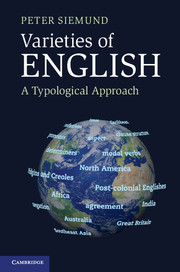Book contents
- Frontmatter
- Contents
- List of figures
- List of tables
- Acknowledgements
- How to use this book
- Abbreviations
- 1 Introduction
- 2 Reflexivity and reflexive marking
- 3 Pronominal gender
- 4 Pronominal case
- 5 Determiners
- 6 Tense marking
- 7 Aspect marking
- 8 Modal verbs
- 9 Negation
- 10 Subject-verb agreement
- 11 Ditransitive constructions
- 12 Interrogative constructions
- 13 The formation of relative clauses
- 14 Summary and outlook
- General references
- Index of languages, varieties, and areas
- Index of names
- Subject index
- References
14 - Summary and outlook
Published online by Cambridge University Press: 05 May 2013
- Frontmatter
- Contents
- List of figures
- List of tables
- Acknowledgements
- How to use this book
- Abbreviations
- 1 Introduction
- 2 Reflexivity and reflexive marking
- 3 Pronominal gender
- 4 Pronominal case
- 5 Determiners
- 6 Tense marking
- 7 Aspect marking
- 8 Modal verbs
- 9 Negation
- 10 Subject-verb agreement
- 11 Ditransitive constructions
- 12 Interrogative constructions
- 13 The formation of relative clauses
- 14 Summary and outlook
- General references
- Index of languages, varieties, and areas
- Index of names
- Subject index
- References
Summary
In this final chapter, I will try to elaborate on essentially three areas that help to position the present book in current research on varieties and variation. These concern, firstly, cross-linguistically exceptional properties of standard and non-standard varieties of English, secondly, the discussion of angloversals and vernacular universals, and, thirdly, the apparent emergence of the new research field of ‘variationist’ or ‘sociolinguistic typology’.
Exceptional properties of English
As I pointed out in Chapter 1, the cross-linguistic approach adopted in this book helps us to separate the wheat from the chaff and to see the patterns of variation attested in varieties of English and their limitations more clearly. In all of the chapters discussing grammatical phenomena, we could observe morphosyntactic coding strategies that are common cross-linguistically, though we also encountered strategies that need to be considered exceptional and rare. In view of the fact that we focused on typological commonalities in the cross-linguistic sections of the preceding chapters, we will here shift the focus to those grammatical phenomena that appear idiosyncratic and infrequent from a cross-linguistic perspective.
- Type
- Chapter
- Information
- Varieties of EnglishA Typological Approach, pp. 278 - 290Publisher: Cambridge University PressPrint publication year: 2013



